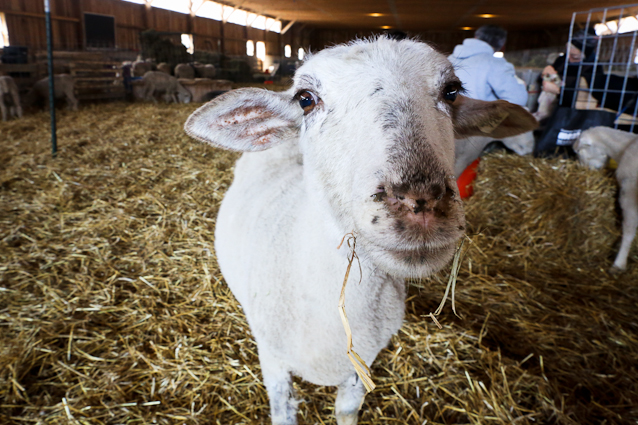Full Circle is a USDA-certified organic farm specializing in grass-fed lamb – their website describes animals “of superior genetic and culinary quality.” We’ve tasted the meat and heartily agree with that assessment. But what makes it superior? What’s the real distinction between one organic lamb and another?
It would be easy to resort to the clichés – “oh, well, it’s local” or “it’s humanely raised” or “twelve masseuses rub them down every day.” But we wanted to know how it really works, so we drove out to the property, which is close to Howell, Michigan, to see first-hand.
To say that the animals are treated well would be an understatement: The owner and her colleagues clearly love these animals, and their comfort and quality of life is paramount. Even in the barn, they’re given a surprising amount of room to roam freely, and access to hay and fresh water is plentiful. It’s also the cleanest animal barn we’ve ever seen.
We were honored to be granted a glimpse of said barn, which is where the lambs (and a few goats) spend the colder months and is home to a lot of their proprietary lambing practices. They work with a few breeds, including Ile de France and Persian, among others. Each of the few hundred lambs is closely tracked to ensure the genetic characteristics they’re looking for. Those that don’t measure up are removed from the breeding pool.
It wasn’t surprising to see that musculature and other physical traits were routinely tracked – but the farmers at Full Circle are committed to raising animals that mother their young well. That behavior is closely monitored and ultimately encouraged. It’s a crucial part of how they raise the animals before they’re set free to roam.
They spend the late winter months in the barn and are later let out to pasture – rotated between different zones across the property’s 300+ acres. The lambs never eat grain, seeing only plants both from the grounds and from hay they produce on-site from their own grasses. Grazing animals will eat from a wide variety of plants over the course of the season – wild grasses, bergamot, and wild onion, for example.
Clearly, the lamb’s deliciousness is derived from ethical treatment and exquisite diet. These are exactly the types of animals we’re looking forward to serving at Selden Standard.
Someone asked us the other day if we were concerned that showing potential customers pictures of insanely adorable lambs would turn some away from eating them. But we think that knowing an animal has had a good life is a crucial part of celebrating what’s at our table. And as discerning omnivores, we’ll be grateful to have the opportunity to serve them to those who enjoy high-quality meats.
Slideshow of Adorable Animals
[slideshow_deploy id=’145′]
